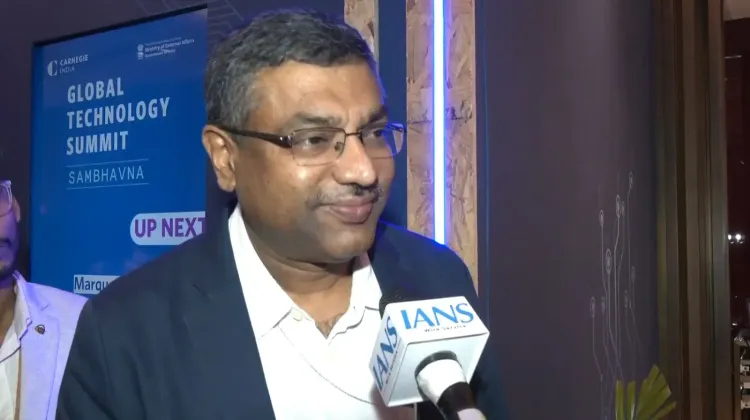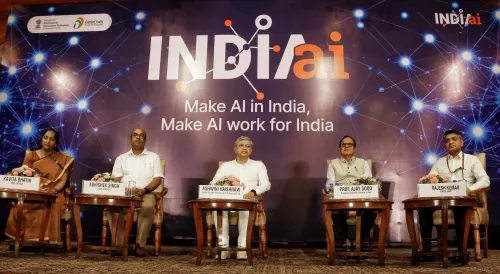India Aims to Spearhead the Global AI Landscape, According to IT Secretary S Krishnan

Synopsis
Key Takeaways
- India aims to lead in global AI development.
- Focus on innovation and inclusivity in AI.
- Regulations should enable AI growth.
- Real commitments over headline-driven investments.
- Success in sectors like agriculture and defense showcases AI’s potential.
New Delhi, April 13 (NationPress) India is not merely engaging in the worldwide artificial intelligence (AI) movement -- it aspires to take the lead, stated S Krishnan, Secretary of the Ministry of Electronics and Information Technology (MeitY).
During a conversation with IANS at the Global Technology Summit held in the national capital, he emphasized that this moment is pivotal for India to implement AI on a large scale within both governmental and business frameworks.
“We are actively ensuring that we remain current and do not lag behind. India must be at the forefront of technology -- and that is the commitment we are making,” Krishnan expressed to IANS.
Referring to AI as the next major opportunity for India, the IT Secretary likened its potential to the “Y2K moment” that revolutionized the nation’s IT industry.
Krishnan underscored that India is determined to shape the future of AI through fostering innovation, inclusivity, and international collaboration.
“India seeks to lead by example, particularly in cultivating partnerships among democratic nations. Our priorities include computing, foundational models, skills enhancement, and establishing a democratic and inclusive AI ecosystem,” he noted.
He also clarified that India's strategy regarding AI regulation is designed to facilitate, not obstruct, innovation.
“Regulatory measures should not impose restrictions that stifle opportunities. They should aim to promote meaningful, safe, and extensive deployment of AI,” Krishnan commented to IANS.
While numerous countries emphasize making significant investments, Krishnan dismissed a sensationalistic approach. He asserted that India is concentrating on tangible results that yield long-term benefits.
“Focusing solely on investment figures will not result in sufficient conversions. This summit is centered on authentic commitments and measurable outcomes,” he stated.
Drawing a parallel with India’s Mars Orbiter Mission, he expressed that India is in search of a “Mangalyaan moment” in AI -- a milestone that signifies substantial advancement.
He further noted that if AI is developed akin to India’s Digital Public Infrastructure (DPI), it could evolve into a national asset with extensive ramifications across various sectors.
Krishnan also pointed out early success stories, including Krishi AI in agriculture and AI-driven advancements in defense operations. These cases, he asserted, demonstrate that AI can produce significant results in critical domains.
When addressing the involvement of civil society and think tanks, Krishnan affirmed the government’s dedication to a multi-stakeholder approach.
“We aim to create opportunities for civil society, academia, and other stakeholders to contribute to the dialogue. In fact, at times, I feel we are dedicating more time to consultations than to actual execution,” he added.









